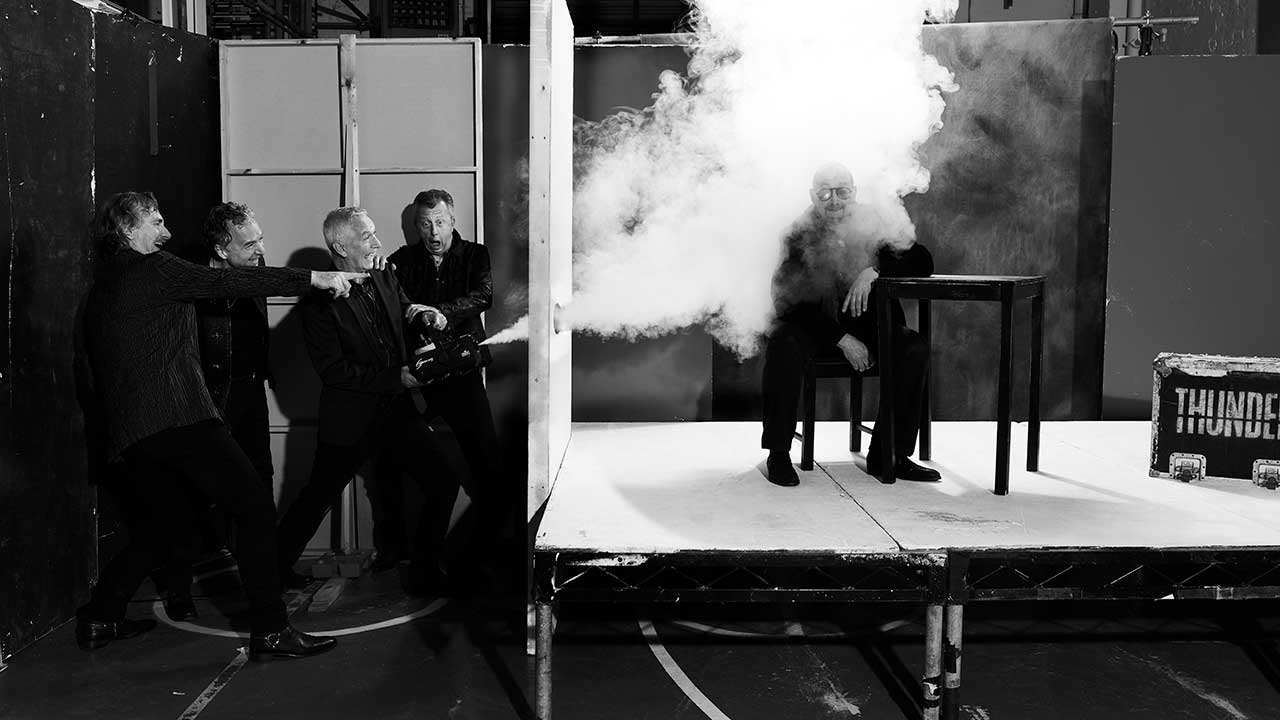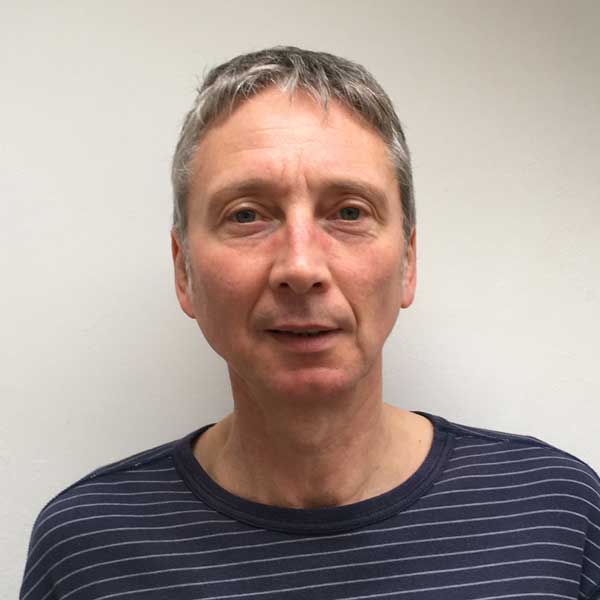The hitherto smoothly cropped Danny Bowes is growing his hair again. Although he insists it’s only because, like the rest of us in lockdown, he has no choice. In the nicest possible way, the man staring out of my screen via Zoom shows none of the debonair style we’ve come to associate with the Thunder frontman. Don’t tell her, but he blames his wife.
“If I leave it to get longer I look like a homeless guy,” he says, “so I let her cut it. Now I look like a fucking convict!”
But, ever the optimist, he’s confident he’ll have got out of jail whenever the band eventually tour to promote their new, thirteenth studio album All The Right Noises. It continued the band’s purple patch of consecutive Top-10 UK chart placings begun with 2015’s Wonder Days – a revelation recorded after a six-year hiatus and in the shadow of second guitarist Ben Matthews’s successful battle with cancer.
Powerful follow-up Rip It Up (2017) boldly refused to sound like it. And on Please Remain Seated (2019) the music was different again – Thunder deconstructing a collection of their own songs and re-imagining them in fresh, mostly acoustic arrangements. But Bowes recalls that exercise as “a real head-fuck” that not everyone appreciated.
“A lot of people said: ‘Oh, that’s it then, is it? Just sit-down stuff from now on? Bad back?’” he recalls. “I won’t name names, but there were some members of the band who were a bit wounded by those comments. It made us all the more determined when we did this one to come back with a really good rock record to prove we weren’t ready for our pipe and slippers quite yet.”
All The Right Noises is a hard rock tour de force that effortlessly kicks those slippers a long way down the road with 11 songs written and produced by guitarist Luke Morley. The point was emphasised last November when the five-piece – completed by bassist Chris Childs and drummer Harry James – posted a pre-release video for its full-on opener Last One Out Turn Off The Lights.
“That was always going to be the first track on the album,” a beaming Bowes says proudly, “from the moment Luke played us the demo. It was such a statement of intent.”
Talking to Classic Rock separately five days later, Luke Morley is proud of it too: “Some people have said it sounds like Whole Lotta Love, but I didn‘t see that. For me it’s more like Fire by the Jimi Hendrix Experience – so I got away with that! The band said the intro reminds them of Deep Purple. I was hearing Rough Boys by Pete Townshend… You’ve got to be who you are. If I can get in all the best bits of the music we listened to as kids and still make it our own, then that’s the game.”

For their fourth consecutive album since beginning their third spell together in 2014, the band recorded at Monmouth’s legendary Rockfield Studios, as used by Black Sabbath, Queen, Rush, Oasis et al.
“The people who run it are mental,” Bowes says, laughing. “The documentary [Rockfield: The Studio On The Farm] only shows half of it! But we get on and they’re nice people to work with. We’ve worked in other studios which are state-of-the-art, but you’re frightened to put your feet up. We like things to be a bit grubby, have a bit of history.”
The album was completed in January 2020, the mix was done by Mike Fraser in Vancouver in March, and with an arena tour announced the band were all ready to go. Then… well, you know what happened next.
They did reconvene at Rockfield in July, after restrictions were lifted, to re-record eight of the new songs live for the two-CD version of the album. The second disc actually begins with four of the “also-rans”, as Bowes calls them, that didn’t make the 11, followed by eight that did, tracked live with backing vocalists Julie McGuire (aka The Duchess in Space Elevator), Carly Green, and Sam Tanner who also played keyboards.
“An eight-piece band performing in the studio!” says Bowes. “For three days we recorded it song by song until we’d got the best take, then went on to the next one – bang-bang-bang. That was the last time we were all in the same room together. “It’s been very frustrating waiting to let people hear this, but when you think about what’s going on in the world – people suffering, losing their lives…. It’s only rock’n’roll, isn’t it?”
Morley echoes Bowes’s enthusiasm for the expanded range of vocal textures boosting his own backing vocals. “I do like harmonies – I’ve always been a massive fan of the Beach Boys and The Beatles. As I wrote these songs I kept hearing them. They feel like the icing on the cake. There aren’t many hard rock bands that do it. It adds another element to the sound. We’ll definitely take extra singers with us when we tour this, because they’re such a part of the album it would be weird not to.”
Even more prevalent on the album is a tone of anger, for which Morley is unapologetic: “You can’t write about chasing girls all your life! I’m getting a bit old for that.”
“On every album there’s always been some form of social commentary,” Bowes continues. “Distant Thunder, Low Life In High Places, It Happened In This Town… but, yeah, I was surprised by the sheer number of angry songs.”
“I didn’t realise how angry I was,” Morley says with a chuckle. “Obviously there was the Brexit thing: Last One Out Turn Off The Lights is my utter frustration at that debacle – four or five years of not being looked after by the government, people promoting those old kinds of racial stereotypes.”
As in the song St George’s Day?
“Yes. It feels like we‘ve gone backwards. I don’t even remember it being this bad in the ’seventies. I find that deeply sad. Dreadful. The thing about Europe, particularly, I found baffling. Well, I know how it happened – people like [Nigel] Farage were whipping up that terrible sense of fear and xenophobia. And there was Trump…”
Morley is pointing to Force Of Nature, which Bowes recognises as one of “two songs that you could level at the orange buffoon, as I call him… Luke wrote it first-person, trying to be inside his mind. I wouldn’t say I tried to channel the buffoon – the song is hard enough anyway, technically – but the lyrics do.
"The other is The Smoking Gun, a warning about the popularism raging around the world and the way social media has fuelled that fire by giving people the ‘truths’ they want to read. These are things Luke cares about.”
Cares about but doesn’t hector, as Morley explains: “If you’re writing songs, you can’t just rant. There has to be some kind of sense of poetry and musicality to it. And also humour.”
That humour (as well as a couple of songs about girls) is on the album too. Laughter has sustained Bowes and Morley since they first met at school nearly 50 years ago and is never far away when they talk. They’re not quite Morecambe & Wise but, like the album title – for those who remember the legendary sketch in which Eric grabs classical conductor Andre Previn by the lapels and through gritted teeth insists: “I’m playing all the right notes, but not necessarily in the right order” – sometimes it comes close.
Bowes points out, though, that All The Right Noises is a line lifted from the album’s second track, Destruction, a deadly serious song about mental health, dementia, depression. “Once again… big riffs, a big rock tune, but written about a serious subject. Every time he sends me a demo I want him to surprise me.
"And the fact he can still do it – with a song like that – after all these years and all these albums is a revelation. When he nails it and he blows my hair back, it’s an amazing feeling. He’s my mate, he writes these tunes, and he can still surprise me. That’s a biggie."
As for the title, Bowes says the Morecambe & Wise thing is a happy accident he’s happy to take because he’s a big fan of the late comedy kings. “Their comedy looks so effortless and made up, but it was so well rehearsed. We’ve always tried to do that too. We haven’t always got away with it, but we’ve tried to.”
The title inspired a Google search for “bizarre musical instruments”, which led to The Singing Ringing Tree – a three-metre-high wind-powered sound sculpture that sits on a hill above Burnley. It’s made out of galvanised steel tubes, each tuned to resonate a different note. A photo of it provides a striking front cover for All The Right Noises.
“As soon as I saw it, I thought it looked like something Storm Thorgerson and Aubrey Powell of Hipgnosis would use,” says Morley. “We’d done a couple of album sleeves with Storm and I liked him a lot. I loved the idea that this thing sits on top of a hill overlooking Burnley, like an alien that had landed there and sat just watching over the town – but making music when the wind blows through it. Very English!”
Morley and photographer Jason Joyce duly drove north in July, and Joyce took photos at various times of the day and night. They later settled on one taken at 3am as the sun was coming up.
“They said it was absolutely freezing,” says Bowes. “Luke sent me video footage of him and Jason all wrapped up with little head-torches on.”
The colours are natural, not Photoshopped. It’s an amazing image and a fitting one for what could be the band’s best album yet. And of course that was always the intention, with the whole band working as hard as they could, applying the same commitment they always have, only now with the added benefit of experience.
“There’s no reason why you can’t get better as you get older, insists Morley. “I’ve met so many people over the years who’ve said to me: ‘Ah, but you’re never going to make an album as good as [the band’s debut] Backstreet Symphony.’ I find that really depressing. Because although I think Backstreet Symphony was fantastic at the time, you can’t stand still.
"You’ve got to move forwards. This new one is better. It’s completely different and totally mature. Like any other kind of art or craft, people who are committed to it do it until they drop, because you are learning all the time."

